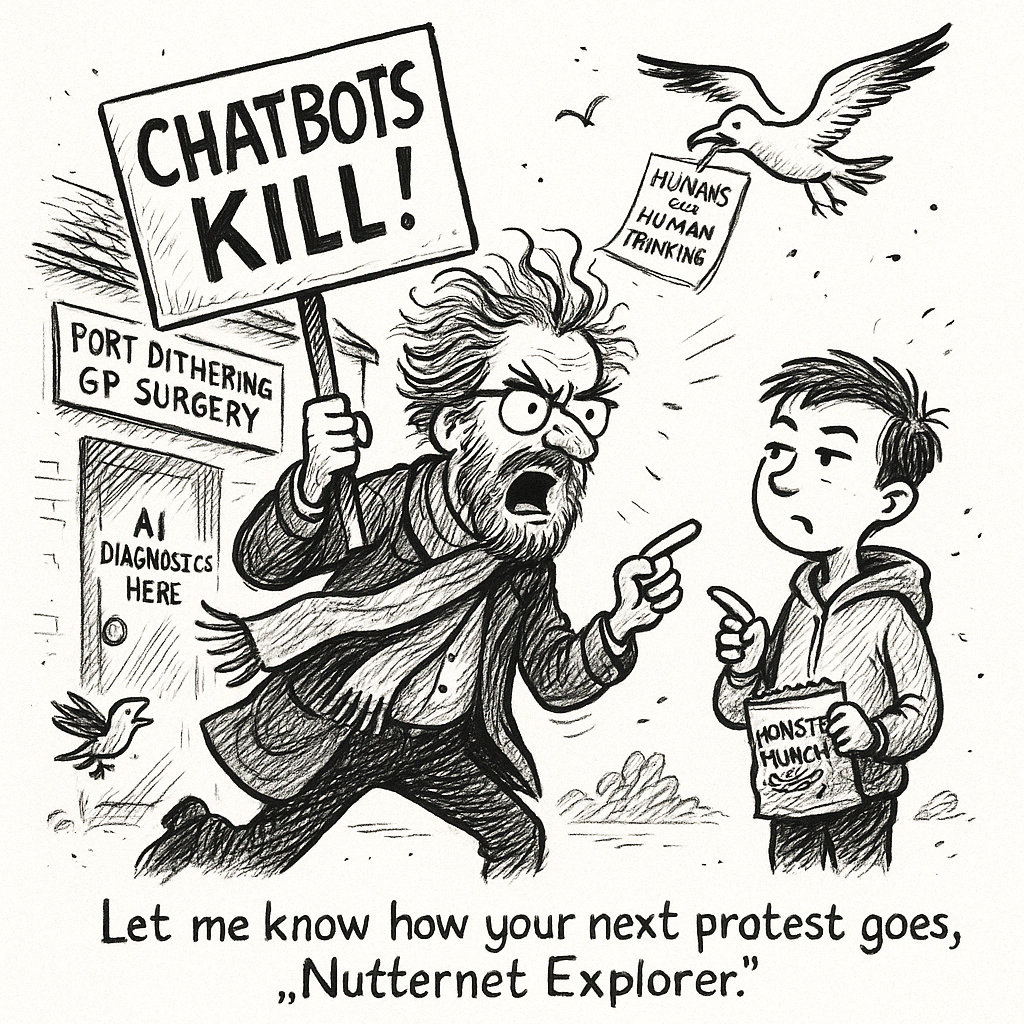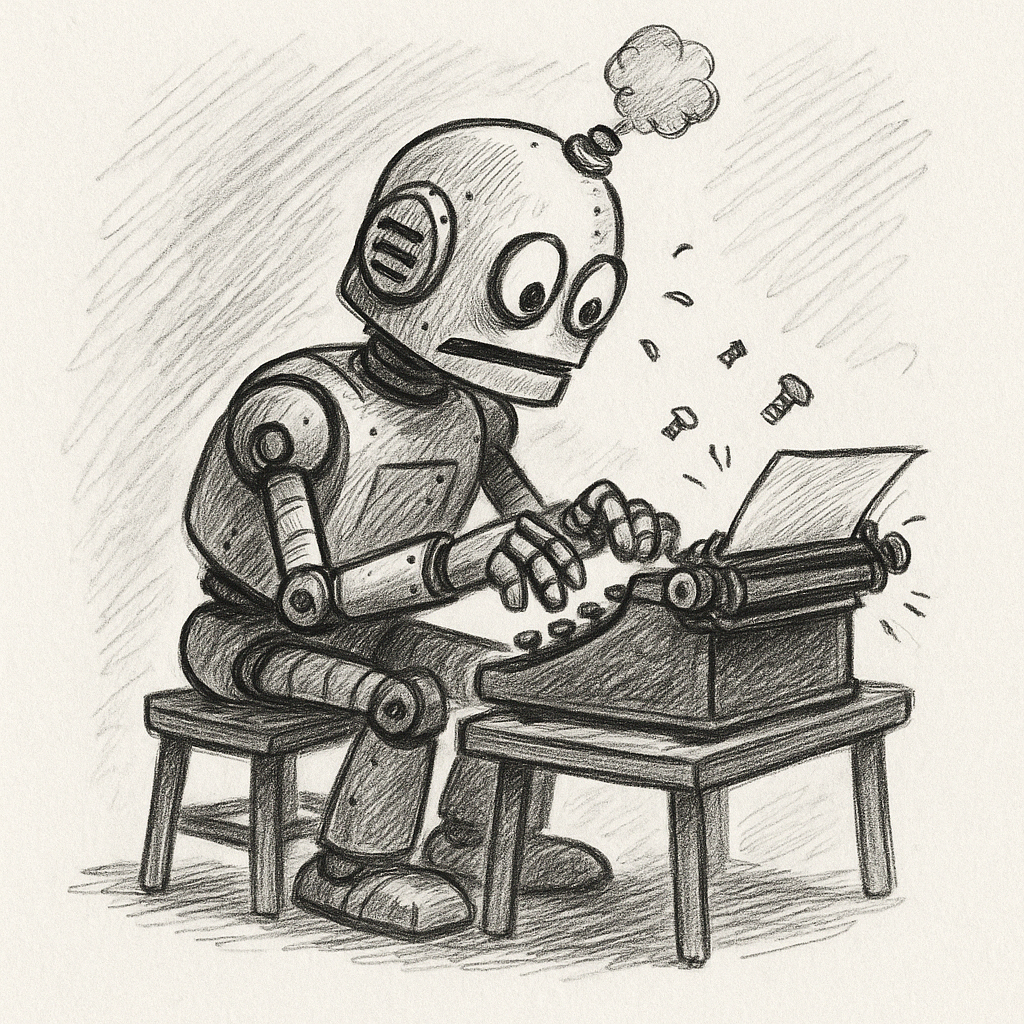Malcolm and the Algorithmic Menace

Malcolm Fitzgibbon had always considered himself a man of principle. This was largely because no one else had ever accused him of being a man of charm, humour, or basic self-awareness. A retired English teacher from Chelmsford (by way of indignation), Malcolm had arrived in the sleepy Cornish town of Port Dithering for a “tech-free holiday” with his wife Cynthia and their long-suffering friend Kevin, who’d brought along a sudoku book and the thousand-yard stare of a man who had once spent a weekend with Malcolm at a mindfulness retreat.
It was day three, and Malcolm was already restless. The sea air, while bracing, offered few opportunities for moral outrage — and the local paper had only run one article on low council grit levels since their arrival. He was beginning to despair.
Then, as if summoned by the gods of righteous fury, he heard it.
“They’re using artificial intelligence at the local hospital now,” said a barista, innocently enough.
Malcolm froze mid-sip. His cappuccino trembled.
“What did she say?” he hissed, leaning toward Kevin like a man overhearing plans for a coup.
Kevin, who had been peacefully contemplating a muffin, looked up. “Hmm?”
“AI! At the hospital! This is how it starts, Kevin. First the computers diagnose colds — next they’ll be performing lobotomies in the car park!”
Kevin nodded. Wisely.
“Yes, I heard it stole all the microchips from ComputersRUs up on the business park!” chimed in Cynthia, whose grasp of computing began and ended with the phrase “turn it off and on again.”
“Now, why? What nefarious business was it up to?” she continued, eyes narrowed.
Malcolm slammed his cup down with the force of a man who had once watched Black Mirror with the subtitles on and considered it a documentary.
“They laughed at me, Cynthia,” he declared, gesturing vaguely at no one in particular. “When I said algorithms were a gateway drug to the collapse of civilisation. They said I was overreacting. Overreacting!”
“You are overreacting, dear,” Cynthia offered gently, adjusting her scarf and giving the barista a look that suggested she’d very much like to speak to the manager, but only once she’d finished her tea cake.
“I shall write a letter!” Malcolm announced, standing up so suddenly his napkin fluttered to the ground like the last shred of dignity in Port Dithering.
Kevin sighed. “To whom?”
Malcolm narrowed his eyes. “Everyone. The council. The hospital. The Daily Telegraph. Maybe even the United Nations.”
Kevin nodded. Wisely.
—
By the following morning, Malcolm had formed an organisation — entirely populated by himself — called Humans for Human Thinking and printed off several dozen flyers using the B&B printer. These were posted under windshield wipers, pinned to the community board (over a missing cat poster), and thrust into the hands of anyone standing still long enough to be declared “concerned.”
The flyer read:
WAKE UP, PORT DITHERING!
Artificial Intelligence is making your medical decisions.
NEXT: Will it teach your children?
Or replace your vicar?
Say NO to robot diagnoses!
Demand HUMAN errors, the way nature intended!
He then set up a folding chair outside the local GP surgery, waving a placard that read “Chatbots Kill!” and humming Jerusalem under his breath.
Inside, Dr. Patel — the local GP — calmly updated Mrs Tremble’s file. Thanks to the AI triage tool trialled by the NHS Trust, her rare liver condition had been flagged in minutes. Before the AI, she’d been dismissed twice as having indigestion and once as “probably just full of gin.”
Outside, Malcolm was engaging a passing dog walker in a breathless monologue about synthetic empathy.
“I’m telling you, it’s diagnosing people using data from social media posts! It’ll be telling you you’ve got mumps because you liked a video of someone sneezing in 2014!”
The dog urinated on his placard.
—
By day four, Malcolm’s campaign had escalated into a full confrontation.
Determined to see the algorithm himself, he marched toward the surgery under the pretence of needing an urgent appointment for “a rogue inflammation of the ethical gland.” But just as he reached the entrance — placard in one hand, leaflet in the other — a small boy wandered over, munching a packet of Monster Munch.
“Why are you saying that about AI?” the boy asked.
Malcolm squinted. “What?”
“I use it all the time,” said the boy — about ten years old, in a hoodie with a dinosaur on it and the casual swagger of someone unbothered by adult nonsense.
“WHAT? Young man, NEVER use it. For anything! Get rid of it from your computer. It will tell you LIES!”
The boy looked puzzled. “Well… it did a great job helping me with my maths homework. I didn’t have a clue. But after AI explained it to me, it made sense.”
“Aha!” Malcolm shouted, triumphant. “You think it did. But I bet when your teacher marks it, you will get a low mark—”
“Erm,” the boy cut in, “I got the best mark in the class?”
He stuck his hands in his pockets and strolled off, muttering, “What a nutter…”
Malcolm stood frozen for a moment. A seagull cawed overhead. His placard drooped.
Then, steeling himself, he marched inside — straight into the mouth of the algorithmic beast.
—
Ten seconds later, the system cheerfully informed him that his blood pressure was high, his cholesterol was concerning, and he had a mild oat milk allergy.
He was escorted from the building shortly afterwards, red-faced and clutching a printout of his own dietary restrictions.
Dr. Patel watched from the window and shook her head. “If only we’d had the AI ten years ago. We might’ve caught his nonsense early.”
Outside, ten-year-old Sam was loitering with a fresh bag of Monster Munch.
As Malcolm stumbled out into the sunlight, flustered and muttering about medical conspiracies and rogue diagnostics, Sam gave him a slow, appraising glance.
“AI told you about the oat milk, didn’t it?” he said.
Malcolm glared at him. “This is far from over.”
Sam nodded solemnly, then broke into a grin. “Sure. Let me know how your next protest goes, Nutternet Explorer.”
He wandered off down the pavement, crunching crisps and humming something vaguely robotic.
